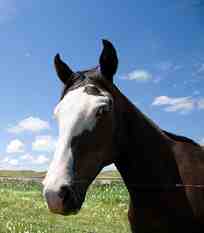
©2010 Jupiterimages Corporation
Horses are extraordinary animals who can live for more than 30 years if cared for properly. But horses face many dangers, from lightning strikes to hay that has been fertilized with poultry manure or contains toxic plants. Learning which plants are toxic to horses can help you prevent your horse from being poisoned. Even if you don’t live with horses, your neighbor might have horses, or horses may have access to your yard. It’s good to know which plants to keep away from them.
The following is a list of plants that are toxic to horses:
- Alsike clovers: These plants pose two hazards—dew poisoning and big liver disease. Dew poisoning is a photosensitivity reaction that results in sunburn of nonpigmented skin. Symptoms include swelling and reddening of the lining of the eyelids, jaundice, gastrointestinal disorders, dark urine, clay-colored feces, and nervousness. All these symptoms are possible, but horses may exhibit all or none of them if clovers are consumed.
- Arum: Symptoms include oral irritation and drooling.
- Chokecherries: The leaves and bark of this plant produce fatal cyanide poisoning in horses. Horses can die within minutes of ingesting the plant, and wilted or stressed leaves pose more of a threat. Symptoms include a lack of coordination, loss of bowel and urine control, flaring nostrils, trouble breathing, and agitation.
- Elephant ears: Symptoms include oral irritation and drooling.
- Lupines: Young lupines and those going to seed are the most toxic. Symptoms include diarrhea, gastrointestinal upset, nervousness, loss of muscle control, and convulsions. Fortunately, if symptoms are treated, horses can often recover.
- Oleander: Symptoms include diarrhea, which is often bloody. Immediate veterinarian care is necessary because death can result within eight to 24 hours.
- Red maple: The leaves and bark are toxic and cause anemia. Symptoms include weakness and cardiac or respiratory distress.
- Rhododendrons and azaleas: Symptoms include frothing at the mouth, green salivation, gastrointestinal irritation, and colic.
- Wild cherries: Cherries produce cyanide poisoning. Horses can die within minutes of ingesting the fruit. Symptoms include trouble breathing, agitation, lack of coordination, flaring nostrils, and loss of bowel and urine control.
- Yew: Symptoms include slowing of the heart rate, cardiac failure, and sudden death. In fact, death can occur in as little as five minutes after ingestion. Unfortunately, there is no antidote, and there is rarely time to initiate treatment.
Other plants that are toxic to horses include avocadoes, tomatoes, onions, and potatoes.
In order to keep your horse safe, you should also check the barn or paddock for hazards, such as sharp edges, nails, hooks, and trash. Horses should have access to clean shavings as well as fresh water and hay. And make sure that their paddock is secure, as sometimes fences can become loose, particularly when branches fall on them.
Do you have any other tips for keeping horses safe?





